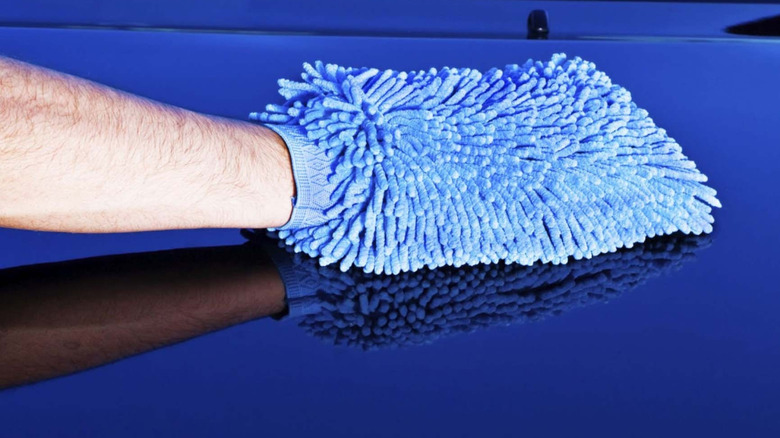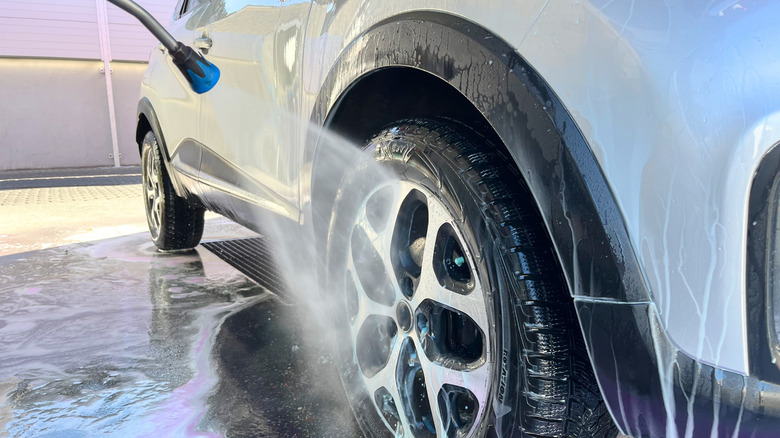The Pros And Cons Of A Waterless Car Wash
A car is like a new pair of white sneakers: No matter how careful you are, they won't stay pristine forever. What this means for drivers is that, alongside all the other little maintenance and repair jobs that go into vehicle ownership, you're going to want to keep your beloved car clean.Whether you set aside time to wash your car in your own home or you go to a car wash, there are more options than some may realize. Waterless car washing is now a thing, though it's not
Just as hand sanitizers and dry shampoos allow us to wash our hands and hair without using water, so a waterless car wash is just that for our vehicles. The concept is similar, with a handy handheld spray replacing a hose or your local car wash. Turtle Wax notes that a blend of lubricants, detergent and wax often work together in these products to complete the process in a trice. All the owner needs to do is carefully wipe the product on the vehicle's body.
If you've only ever washed your car with water, you might wonder why this technique isn't more widespread. Ultimately, it's a matter of preference, because a waterless car wash isn't necessarily a quicker and more convenient route to take in every case. Let's take a look at the pros and cons, taking into account efficiency, environmental friendliness, affordability and other factors, to see which method might be right for you.
The pros of a waterless car wash
Anywhere we can drive down our water consumption, as a general rule, is a good thing. After all, our usage of this precious, life-giving resource can be quite shocking. The Environmental Protection Agency reports that "the average American uses around 82 gallons per day per person in the household." If you're merrily slinging suds as you wash your vehicle, especially if you do so frequently, this can be a significant contributor to these numbers.
One of the most important advantages of a waterless car wash, then, is the most obvious: It doesn't require water. Additionally, the necessary equipment – typically a microfiber cloth and the spray or product itself – is easily portable and can be taken almost anywhere, allowing you to stow it in your vehicle along with the usual supplies and tools you'll keep in there for emergencies. The advantage of the microfiber cloth typically used in the process is that it can gently lift away small particles the solution has begun to dislodge.
Water, needless to say, has a habit of sneaking in where it doesn't belong, and can cause a lot of damage when it does. A wash with water, at home or at a car wash, could potentially contribute to corrosion or rust if not performed with due diligence and the right equipment. There are hidden dangers of car washes to be wary of. This particular concern is eliminated when water is removed from the equation. Car And Driver also notes that visits to a conventional car wash can eat away at the wax on a car's body over time, so the protective polymers introduced with a waterless wash may be less harsh on its surface.
The cons of a waterless car wash
The advantages of washing your vehicle without water, then, are considerable, but there are some disadvantages. If your vehicle is particularly dirty, perhaps owing to the terrain or the ill effects of weather, it would be more difficult to perform an effective waterless wash. The process can be most effective when regularly freshening up a chassis lightly affected by dust or dirt from driving on the roads.
We've noted that frequent heavy car washes can have a negative effect on the finish of your vehicle, and this is also true with their waterless counterparts. Being delicate with the microfiber cloth and using the right technique to avoid any scratches is an important concern, but so too is using the right product in the first place. It's always vital to be careful with cleaning products and the surfaces they're applied to. The graphene coatings of some vehicles, for instance, will be adversely affected, and so it's important to be wary and seek professional advice if you're unsure whether a waterless wash might cause damage.
As with so many staple car maintenance products, quality, pricing, and functionality can differ considerably, and you might find yourself spending a lot more for a waterless car wash than if you'd washed your vehicle with water and soap. A more conventional wash can also use more specialised equipment, though, and a real deluge can be called for if your vehicle has gotten particularly dirty. How often you should wash your car, and how, will depend a lot on your circumstances, and it can be beneficial to use both methods depending on circumstances.


